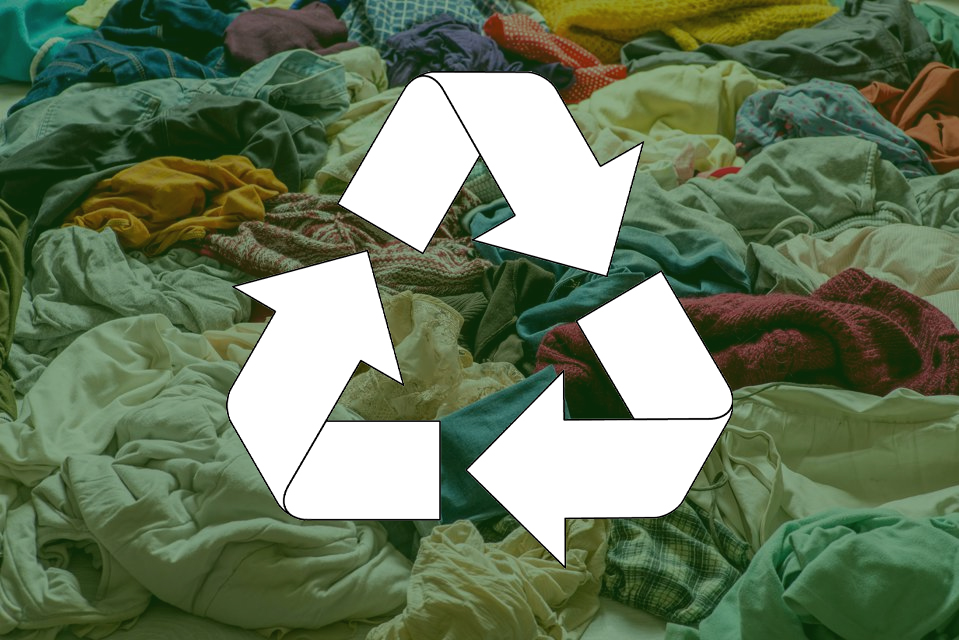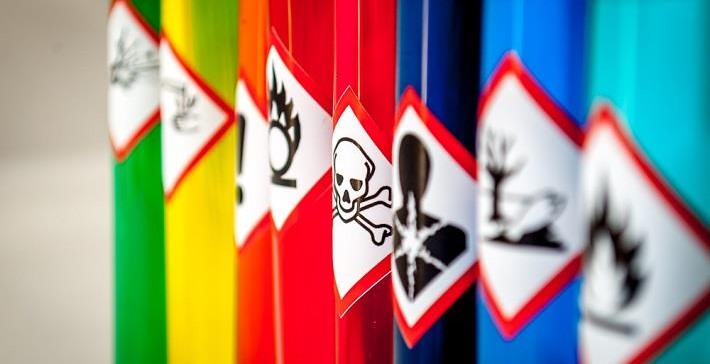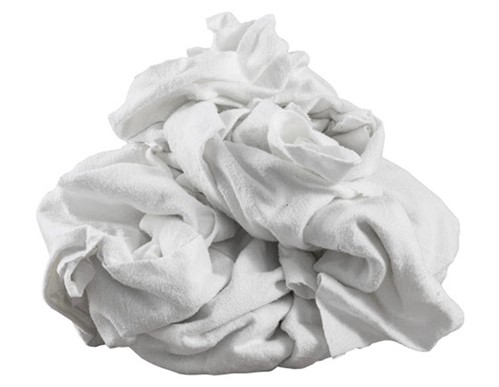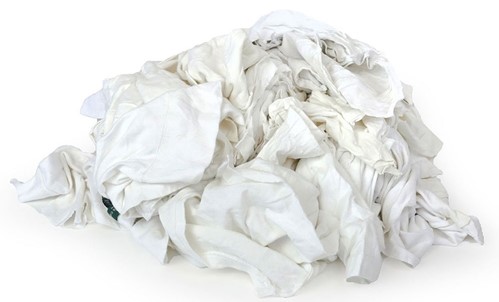Shop rags and wiping towels are a staple resource in many industries for cleaning up messes made from dirt, oil, grease, and water. While these are vital to many people’s everyday routine, their environmental impact is often overlooked and most people aren’t sure how to choose the most efficient cloths for different spills. Manufactured shop towels and rags take a vast amount of time, energy, and resources to produce, which causes a lot of strain to the environment. However, using rags made from recycled shirts, blankets, flannels, and leftover materials is a more sustainable and inexpensive option for cleaning up workplace messes, and work just as well, if not better, than manufactured ones! The difference is all in how you choose which shop rag is right for the job you need done.
What’s the Environmental Impact?
Sustainability is a growing concern, and it’s important that we all do our part to keep our impact on the environment minimal. Did you know that it takes 17 gallons of water and 66 BTUs of energy to produce just one cotton shop towel, whereas using a recycled towel requires no extra water or energy?
Additionally, the dying and manufacturing process of cotton rags uses a lot of harsh chemicals such as lead, xylene, zinc, copper, and other heavy metals that eventually flow into our waterways–contaminating rivers, lakes, and public sources of drinking water. The Environmental Protection Agency (EPA) estimates that 10 million pounds of untreated contaminants infect waterways from the production and use of laundered shop towels each year. Switching to recycled rags can eliminate this, and not only are they much more environmentally friendly, but they’re cheaper than manufactured ones as well! Over 95% of clothing materials are recyclable, so using them as shop rags and wipers is a great way to keep them out of landfills.
Not only are manufactured shop towels affecting the environment, but they can also cause problems for the workers that are directly using them. Many laundered cotton shop towels do not meet the legal standards for chemical contaminates, which can create an unsafe work environment and be extremely damaging to your health for those who are repeatedly exposed to their harsh chemicals and carcinogens. Rags made from recycled shirts, blankets, and flannels are just as effective, they produce less waste, and don’t contain the toxic chemicals that many manufactured ones do.
What Options Do We Have?
Ohio Power Tool has a great selection of recycled shop rags that can be used in many different industries and many different ways. Most of the cloths that we carry are broken down into 3 primary categories: Reclaimed clothing such as t-shirt, blanket, and flannel materials from thrift systems; Millends that haven’t been turned into some type of garment from textile mills; and hospital linens such as towels, sheets and blankets. These materials are collected and repurposed into shop rags to keep them out of landfills and give them another purpose after they have been donated.
Which Type is Best?
There really isn’t one superior cloth to use for every situation, because different materials offer different benefits. If you’ve ever found yourself trying to clean up a mess with a material that isn’t very absorbent and instead seems to just push everything around, I’m sure you know what we mean. Here is how they generally compare:
- Reclaimed Colored T-Shirt Grade Wiping Cloths: These are the #1 selling grade of industrial wiping cloth because they are affordable and able to efficiently absorb water, grease, oil, and paint. These rags are made of reclaimed t-shirts, polos and other similar knit materials that are cut into wiper size with the zippers and buttons removed. Because they are lightweight, you get a lot of pieces per pound that you purchase. This type of material is ideal for those working in/with vehicle and fleet maintenance, asphalt, grease and oil apps, roofing and painting. These are the most versatile wiper option that we offer, and we recommend Anchor AWC-20-202-B-COMP.
- Reclaimed White Sweatshirt Wiping Rags: If you’re looking for an all-white rag to avoid color transfer, these are a great, economical option because they don’t have the harsh chemicals or higher price tag that bleached, manufactured rags do. Like the t-shirt material, recycled white sweatshirt rags do typically come in odd shaped pieces, but this material is slightly bulkier. These are good on grease and oil, but offer limited absorption on water. Commercial roofing, cleaning seams on rolled rubber roofing, polishing, and wiping applications work well with this type of rag. We recommend Anchor AWC-20-206W-10-COMP. If you’re not concerned with color transfer, you can also use colored sweatshirt wiping rags, which otherwise offer the same benefits but at an even cheaper price. For a colored sweatshirt option, we recommend SWRCSMC-25 (call to order).
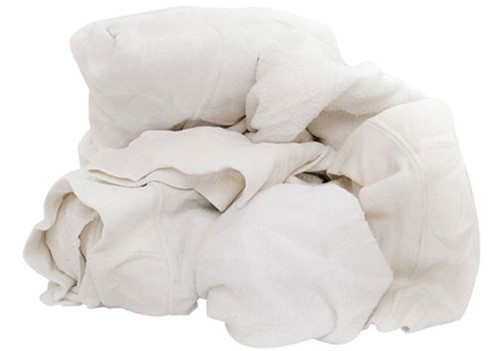
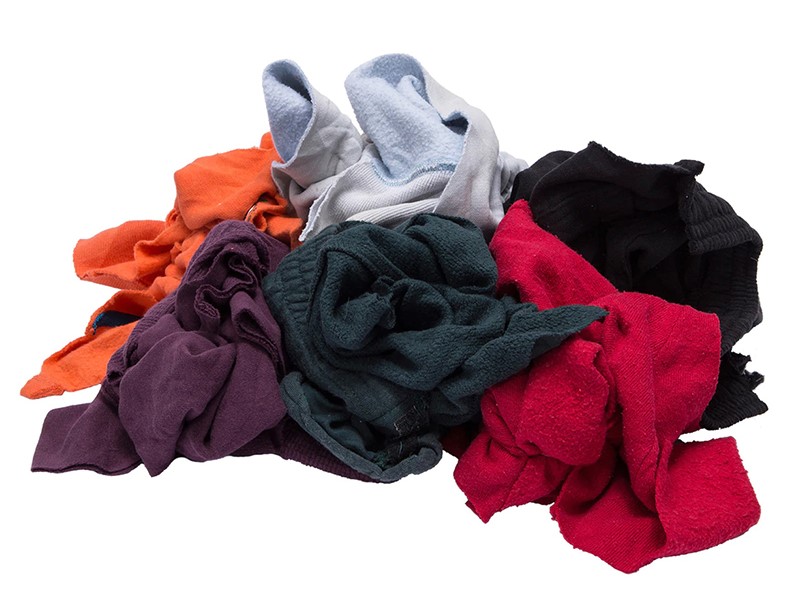
- Reclaimed Color Cotton Blanket: Heavy weight blanket pieces are great for absorbing water, oil, and grease. They are made of 100% Cotton and don’t create lint when used. An added benefit of these is that they come in consistent, even sized pieces and are very thick and absorbent. They are great for mechanical contractors, welding/pipefitting, wiping out condenser trays & coil cleaning projects. We recommend Anchor AWC-20-216-10-COMP.
- Reclaimed White Cotton Flannel: Our most absorbent option for both oil and water, these rags are made of 100% cotton reclaimed white flannel material. They are low lint, all white, and good for any industrial wiping task. Like the t-shirt grade cloths, you can get a lot of pieces per pound due to their size. We recommend Anchor AWC-20-204W-25-COMP.
- White Terry Cloth 1/2 Cut Towels: If water is what you’re working with, these are a great option. Terry cloth offers great absorbency on water, and the rags are typically large and thick. This material is well suited for plumbing and vehicle fleet washing. We recommend Anchor AWC-30-400HC-B-COMP.
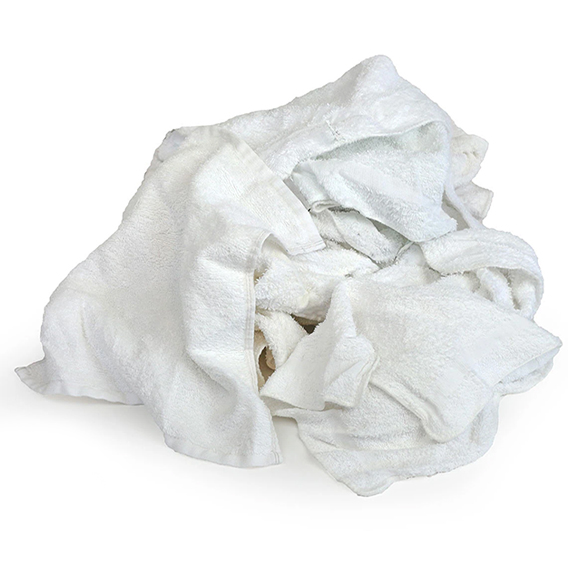
- New Washed White Knit: For critical tasks such as staining, finishing, paint and body work, sign manufacturing, and powder coating, these are the superior option. New washed white knit rags are made from materials that were left over from textile mills and never used for any other purpose. These are high quality because they do not transfer color, produce very little lint, are lightweight, and you can get many pieces per pound. We recommend OPT-10-100-B-COMP.
Switching to recycled rags instead of purchasing new ones will greatly reduce waste, use of resources, and hazards to the environment and your employees. Still not sure which type of recycled rag is the best for you? Check out our Quick Guide reference below! If you still have questions, give us a call at 800-242-4424, email us at sales@ohiopowertool.com, or leave a comment below for any questions or concerns you may have. We’re happy to help! To be the first to know about new products and deals, subscribe to our e-newsletter and follow us on social media!




